希特勒早期生活 英文
- 格式:ppt
- 大小:1.68 MB
- 文档页数:27
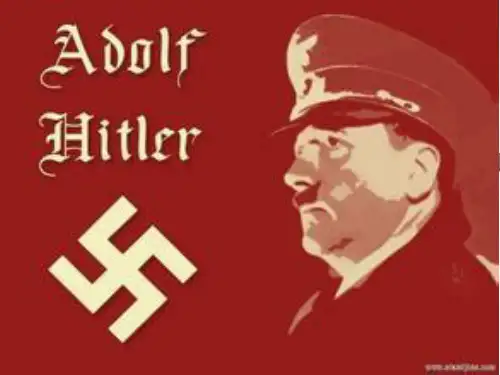
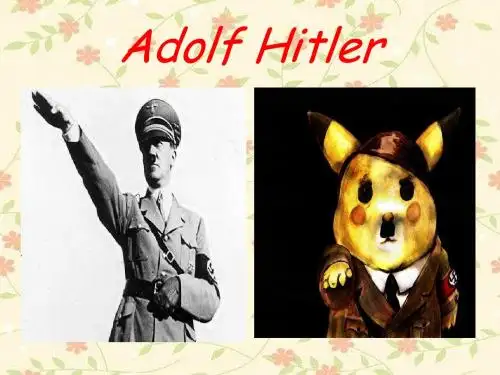
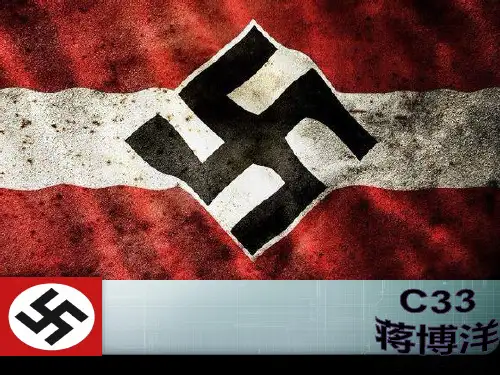
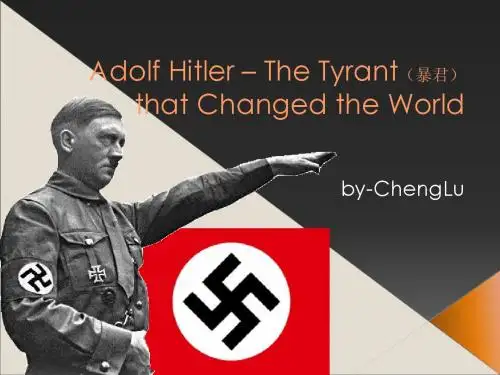
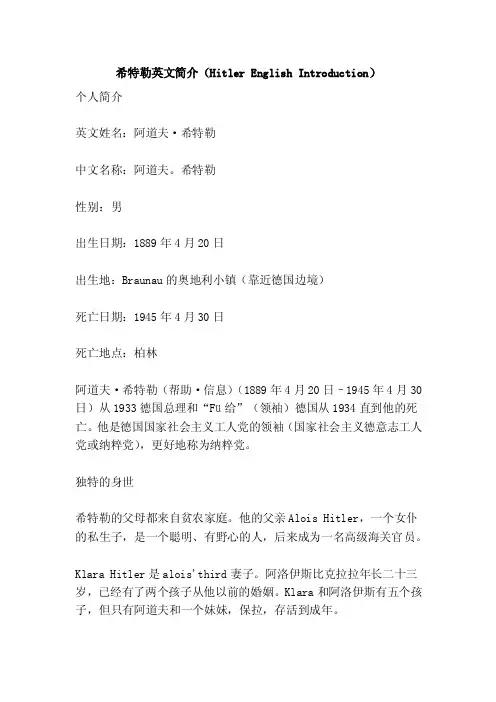
希特勒英文简介(Hitler English Introduction)个人简介英文姓名:阿道夫·希特勒中文名称:阿道夫。
希特勒性别:男出生日期:1889年4月20日出生地:Braunau的奥地利小镇(靠近德国边境)死亡日期:1945年4月30日死亡地点:柏林阿道夫·希特勒(帮助·信息)(1889年4月20日–1945年4月30日)从1933德国总理和“Fü给”(领袖)德国从1934直到他的死亡。
他是德国国家社会主义工人党的领袖(国家社会主义德意志工人党或纳粹党),更好地称为纳粹党。
独特的身世希特勒的父母都来自贫农家庭。
他的父亲Alois Hitler,一个女仆的私生子,是一个聪明、有野心的人,后来成为一名高级海关官员。
Klara Hitler是alois'third妻子。
阿洛伊斯比克拉拉年长二十三岁,已经有了两个孩子从他以前的婚姻。
Klara和阿洛伊斯有五个孩子,但只有阿道夫和一个妹妹,保拉,存活到成年。
发展过程1.student2.soldier3.do在小学4.stop试图成为第一研究最喜欢的游戏艺术5.move维也纳6.receive父亲的公务员养老7.volunteer FR德国军队在慕尼黑9.rebuild8.be纳粹aarty其他士兵逮捕10.establish第三帝国11.base专制mand他的军队去打仗13.die希特勒与中日关系的两面性希特勒关于中国和日本1的想法。
鄙视日本看好中国他看着日本。
但是,他看好中国。
2。
喜欢中国茶叶希特勒喜欢喝中国茶。
3。
希特勒不准报道南京大屠杀希特勒不允许人们报告南京大屠杀。
阿道夫。
希特勒已经不再是之一个人,他泛指了一个时代的血型与残暴,扭曲与狭隘。
他是法西斯的象征,而他背后,是第二次世界大战的开始与终结。
阿道夫·希特勒不再是一个人,他是指血液和残酷的时代,失真和狭窄。
他是法西斯的象征,在他身后,是第二次世界大战和结束的开始。
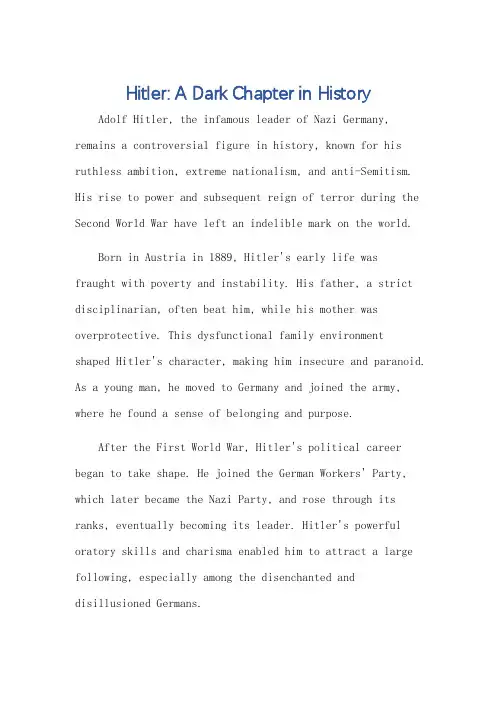
Hitler: A Dark Chapter in HistoryAdolf Hitler, the infamous leader of Nazi Germany, remains a controversial figure in history, known for his ruthless ambition, extreme nationalism, and anti-Semitism. His rise to power and subsequent reign of terror during the Second World War have left an indelible mark on the world.Born in Austria in 1889, Hitler's early life wasfraught with poverty and instability. His father, a strict disciplinarian, often beat him, while his mother was overprotective. This dysfunctional family environment shaped Hitler's character, making him insecure and paranoid. As a young man, he moved to Germany and joined the army, where he found a sense of belonging and purpose.After the First World War, Hitler's political career began to take shape. He joined the German Workers' Party, which later became the Nazi Party, and rose through its ranks, eventually becoming its leader. Hitler's powerful oratory skills and charisma enabled him to attract a large following, especially among the disenchanted anddisillusioned Germans.Hitler's political philosophy was based on extreme nationalism, anti-Semitism, and social Darwinism. He believed that the German race was superior to all others and that the Jews were a threat to German society. He advocated for the expansion of German territory and the elimination of all perceived threats to the Reich.Under Hitler's leadership, the Nazi Party gained significant political power in Germany. In 1933, Hitler became the Chancellor of Germany and quickly consolidated his grip on power. He abolished democratic institutions, established a totalitarian state, and began to implement his radical agenda.Hitler's reign of terror was marked by widespread discrimination, persecution, and violence. Jews, homosexuals, political opponents, and others were targeted for elimination. Concentration camps were established, and millions of people were killed or enslaved. Hitler's ambitions led him to invade numerous countries, including France, Belgium, the Netherlands, and Russia, in a bid for world domination.The Allied Powers, led by the United States, Great Britain, and Russia, eventually defeated Germany in the Second World War. Hitler's reign came to an end in April 1945, when he committed suicide in his bunker in Berlin, rather than face capture and trial.The legacy of Hitler and the Nazi era is complex and multifaceted. While Hitler's actions and ideologies were barbaric and reprehensible, they also serve as a stark reminder of the dangers of unchecked ambition, intolerance, and hatred. Hitler's rise to power and the atrocities committed under his leadership are a cautionary tale forall nations and generations.**希特勒:历史中的黑暗篇章**阿道夫·希特勒,纳粹德国的臭名昭著的领导人,以他冷酷无情的野心、极端民族主义和反犹太主义而臭名昭著,在历史中是一个充满争议的人物。
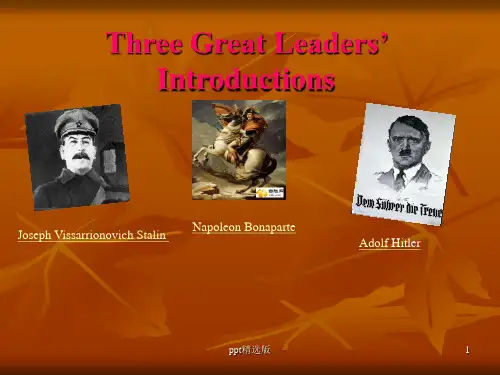
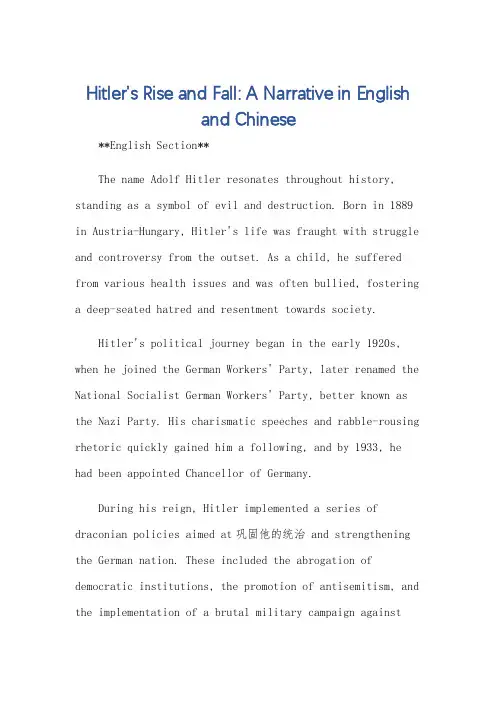
Hitler's Rise and Fall: A Narrative in Englishand Chinese**English Section**The name Adolf Hitler resonates throughout history, standing as a symbol of evil and destruction. Born in 1889 in Austria-Hungary, Hitler's life was fraught with struggle and controversy from the outset. As a child, he suffered from various health issues and was often bullied, fostering a deep-seated hatred and resentment towards society.Hitler's political journey began in the early 1920s, when he joined the German Workers' Party, later renamed the National Socialist German Workers' Party, better known as the Nazi Party. His charismatic speeches and rabble-rousing rhetoric quickly gained him a following, and by 1933, he had been appointed Chancellor of Germany.During his reign, Hitler implemented a series of draconian policies aimed at巩固他的统治 and strengthening the German nation. These included the abrogation of democratic institutions, the promotion of antisemitism, and the implementation of a brutal military campaign againsthis neighbors. Hitler's ambitions were not limited to Europe; he had grandiose plans to establish a thousand-year Reich that would encompass all of Europe and beyond.Hitler's most notorious act was the initiation of the Second World War in 1939. His aggression led to the deaths of millions, not only in Europe but also in Asia and the Pacific. Hitler's obsession with racial purity led to the systematic persecution and murder of Jews, Poles, and other minorities through the infamous Holocaust.However, Hitler's reign of terror did not last forever. By 1945, the Allies had advanced into Germany, and Hitler's days were numbered. On April 30th, 1945, Hitler committed suicide, bringing an end to his tyrannical regime.**Chinese Section**希特勒的崛起与覆灭阿道夫·希特勒这个名字在历史中回响,成为邪恶与毁灭的象征。
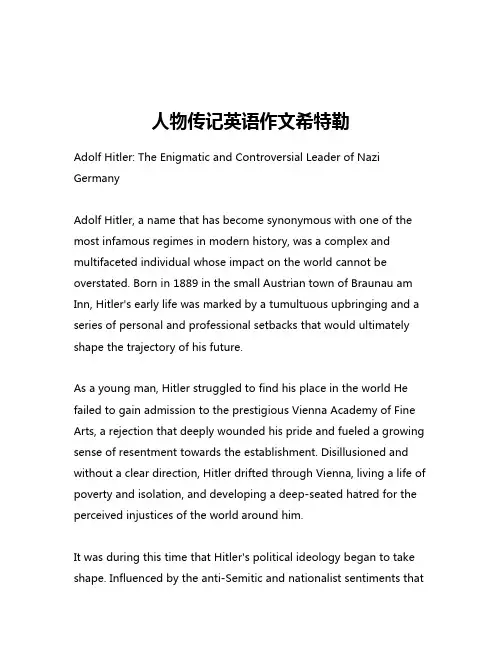
人物传记英语作文希特勒Adolf Hitler: The Enigmatic and Controversial Leader of Nazi GermanyAdolf Hitler, a name that has become synonymous with one of the most infamous regimes in modern history, was a complex and multifaceted individual whose impact on the world cannot be overstated. Born in 1889 in the small Austrian town of Braunau am Inn, Hitler's early life was marked by a tumultuous upbringing and a series of personal and professional setbacks that would ultimately shape the trajectory of his future.As a young man, Hitler struggled to find his place in the world He failed to gain admission to the prestigious Vienna Academy of Fine Arts, a rejection that deeply wounded his pride and fueled a growing sense of resentment towards the establishment. Disillusioned and without a clear direction, Hitler drifted through Vienna, living a life of poverty and isolation, and developing a deep-seated hatred for the perceived injustices of the world around him.It was during this time that Hitler's political ideology began to take shape. Influenced by the anti-Semitic and nationalist sentiments thatwere gaining traction in Europe, he became increasingly drawn to the idea of a unified, racially pure German state. His early writings and speeches reflect a man consumed by a desire for power and a belief in the superiority of the Aryan race.In 1919, Hitler joined the German Workers' Party, a small political organization that shared his nationalist and anti-Semitic views. Over the next few years, he rapidly rose through the ranks, using his charismatic oratory skills and shrewd political maneuvering to transform the party into the National Socialist German Workers' Party, or the Nazi Party. With Hitler at the helm, the party's message of German nationalism, anti-Semitism, and the promise of a strong, unified nation resonated with a population that had been devastated by the aftermath of World War I.As the Nazis gained power in the early 1930s, Hitler's ambitions only grew. In 1933, he was appointed Chancellor of Germany, and within a year, he had consolidated his grip on power, establishing a totalitarian dictatorship. Under his leadership, the Nazi regime embarked on a campaign of persecution and genocide, targeting Jews, political dissidents, and other "undesirable" groups. The horrors of the Holocaust, in which millions of people were systematically murdered, stand as a grim testament to the depths of Hitler's cruelty and the devastating consequences of his ideology.Beyond the atrocities committed by the Nazi regime, Hitler's impact on the world was also felt through his military aggression and the outbreak of World War II. Driven by a desire for territorial expansion and a belief in the inherent right of the German people to dominate Europe, Hitler launched a series of military campaigns that plunged the world into a devastating conflict. The war, which lasted from 1939 to 1945, resulted in the deaths of millions of people and the destruction of countless cities and communities.Despite the overwhelming evidence of his crimes and the widespread condemnation of his actions, Hitler remains a figure of enduring fascination and controversy. Some view him as a charismatic and influential leader who was able to rally a nation in the face of adversity, while others see him as a ruthless and evil tyrant whose legacy is forever stained by the horrors of the Holocaust and the devastation of World War II.Ultimately, the legacy of Adolf Hitler is a complex and multifaceted one, one that continues to be debated and analyzed by historians, political scientists, and the public at large. Whether he is remembered as a brilliant strategist, a demagogue, or a monster, there is no denying the profound and lasting impact that he had on the course of history.。
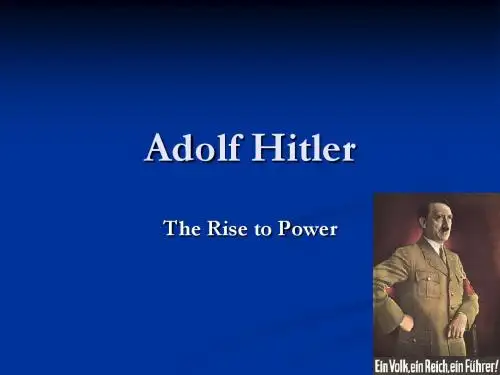
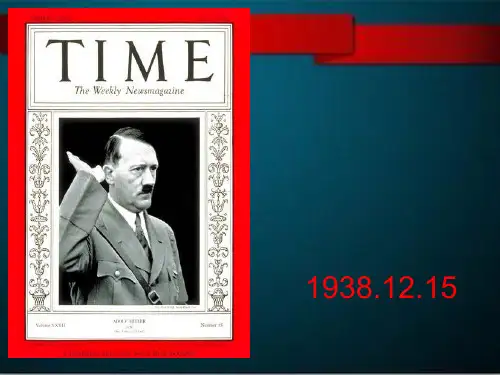
希特勒情感经历介绍英语Adolf Hitler, the infamous leader of the Nazi Party and orchestrator of World War II, is a figure whose personal life is often shrouded in mystery and controversy. While his political and military actions are well-documented, his emotional experiences are less explored. Here's an overview of Hitler's known emotional and personal relationships:1. Childhood and Family Life: Hitler was born in Austria in 1889. His relationship with his father was reportedly strained, and this may have influenced his later emotional development. His mother's death in 1907 was a significant event that affected him deeply.2. Relationship with Women: Hitler's relationships with women were few and far between. He was known to have a romantic interest in his half-niece, Geli Raubal, who died under mysterious circumstances in 1931, which some believe was a suicide. This event was a significant emotional blow to Hitler.3. Marriage to Eva Braun: Eva Braun was Hitler's long-term companion and, in the final days of the war, his wife. They were married for less than 40 hours before they both committed suicide. Eva Braun's influence on Hitler is a subject of speculation, but it is believed that she provided some emotional support to him.4. Relationship with his Generals: Hitler's interactions with his military officers were often fraught with tension. He was known to be volatile and unpredictable, which likely affected his emotional state and the atmosphere within his inner circle.5. The Impact of War: The progression of World War II, with its initial victories and eventual defeats, had a profound impact on Hitler's emotional state. As the tide of war turned against Germany, Hitler became increasingly isolated and erratic.6. Suicide: Hitler's suicide in his bunker in Berlin in April 1945 is indicative of a deeply troubled emotional state. Itis believed that the despair and hopelessness of thesituation drove him to take his own life, along with Eva Braun.7. Emotional Isolation: Throughout his life, Hitler was known to be a loner with few genuine friendships. His emotional isolation may have contributed to his radical ideologies and actions.8. Psychological Assessments: There have been numerous attempts to psychologically profile Hitler, with some suggesting he suffered from various mental health issues that could have influenced his emotional experiences and behavior.It's important to approach the topic of Hitler's emotional experiences with sensitivity and an understanding of the historical context. His actions led to the suffering ofmillions and the Holocaust, which must be acknowledged and remembered. The exploration of his personal life is not to sympathize with his actions but to better understand the complexities of history.。
英语介绍希特勒的作文简单Title: Adolf Hitler: A Brief Introduction。
Adolf Hitler, born on April 20, 1889, in Braunau am Inn, Austria, rose to become one of the most notorious figuresin history. His impact on the world, particularly duringthe 20th century, cannot be overstated. Hitler's life, beliefs, and actions continue to be subjects of intense study and debate.Early Life:Hitler's early life was marked by struggles and aspirations. He was the fourth of six children born toAlois Hitler and Klara Pölzl. His childhood was notwithout difficulties, as his father passed away when he was just 13 years old. After his father's death, Hitler's ambition to become an artist led him to Vienna, where he attempted to gain admission to the Academy of Fine Arts. However, he faced rejection, which fueled his growingresentment and disillusionment.Rise to Power:Following World War I, Hitler found his way into politics. He joined the German Workers' Party, which later transformed into the National Socialist German Workers' Party (NSDAP), commonly known as the Nazi Party. Hitler's charismatic speaking abilities and radical nationalist views quickly gained him attention and support within the party. By 1933, amidst political turmoil and economic instability, Hitler was appointed Chancellor of Germany. His consolidation of power was swift, culminating in the establishment of a totalitarian regime.Beliefs and Ideology:Central to Hitler's ideology was the notion of racial superiority, particularly the belief in the superiority of the Aryan race. He propagated anti-Semitic sentiments, blaming Jews for various societal ills and advocating for their exclusion and eventual eradication. Hitler's visionof a racially pure Germany led to the implementation of discriminatory laws and, ultimately, the systematic genocide of six million Jews during the Holocaust.World War II:Hitler's aggressive expansionist policies and militarization of Germany inevitably led to the outbreak of World War II in 1939. His invasion of Poland prompted the Allied powers, including Britain, France, and later the United States, to declare war on Germany. Hitler'sstrategic errors and overreach, particularly the ill-fated invasion of the Soviet Union in 1941, contributed to Germany's eventual defeat. The war resulted in unparalleled devastation and loss of life, with estimates of over 70 million people killed.Downfall and Legacy:As Allied forces closed in on Germany in 1945, Hitler's regime crumbled. Rather than face capture and trial, Hitler committed suicide in his underground bunker in Berlin onApril 30, 1945. His death marked the end of one of the darkest chapters in human history. The legacy of Adolf Hitler remains a stark reminder of the dangers of unchecked power, propaganda, and intolerance.In conclusion, Adolf Hitler's life and actions continue to be subjects of both fascination and horror. His rise to power, driven by nationalist fervor and fueled by hatred, led to catastrophic consequences for millions of people. Understanding Hitler's legacy is crucial in preventing the recurrence of similar atrocities in the future.。
一篇关于希特勒的背景和影响英语作文Who Was Adolf Hitler?Adolf Hitler was a very bad man who lived in Germany a long time ago. He was the leader of the Nazi Party and became the ruler of Germany from 1933 until 1945 during World War II. Hitler had a huge impact on history because of the terrible things he did and the millions of people he hurt.Hitler's Early LifeHitler was born in 1889 in Austria. As a young man, he struggled to make friends and do well in school. He failed to get into art school and drifted around doing odd jobs. When World War I started in 1914, Hitler joined the German army and served as a messenger on the front lines. He was awarded some medals for bravery.After the war ended in 1918, Hitler was very upset that Germany had lost. He blamed Jewish people and communists for Germany's defeat. In 1919, he joined a small far-right political party called the German Workers' Party which later became the Nazi Party.Hitler and the Nazi PartyThe Nazi Party believed that the "Aryan" German people were a superior master race. They discriminated against Jewish people, criticized democracy, and wanted to unite allGerman-speaking areas into one great German empire.Hitler was a powerful public speaker who could stir up a lot of anger and hatred. As the Nazi Party grew stronger in the 1920s, its members used violence against opponents and Jewish people. In 1923, Hitler tried to take over the government in Munich but his attempt failed and he went to jail.After getting out of jail, Hitler decided to try building his Nazi movement peacefully and through democratic means at first. The Nazi Party gained more support from Germans who were very unhappy about economic problems like high unemployment after the Great Depression started in 1929.Hitler Becomes Dictator of GermanyIn 1933, Hitler was appointed Chancellor of Germany after the Nazi Party won the largest share of seats in parliamentary elections. Once in power, Hitler quickly made himself an absolute dictator, outlawed all other political parties, and had his opponents arrested or killed. Through fear and propaganda, he enforced the Nazi racist beliefs across German society.World War II and the HolocaustAfter becoming dictator, Hitler openly defied the Treaty of Versailles that had been imposed on Germany after World War I. He rapidly re-armed the German military and started making territorial demands to unite ethnic Germans outside Germany's borders. This aggression led Britain and France to declare war on Germany in 1939, starting World War II in Europe.As part of Hitler's deranged racist beliefs, he wanted to create a "master race" based on people with blonde hair and blue eyes. He viewed Jews, Slavs, Roma people, disabled people, and others as racially inferior. The Nazis brutally persecuted these "undesirables", killing as many as they could in what is known as the Holocaust.Millions of Jews were rounded up into overcrowded ghettos and Nazi death camps like Auschwitz. There, they were starved, forced into harsh labor, experimented on in cruel ways, or systematically killed in gas chambers. By the end of the war in 1945, the Nazis had slaughtered around 6 million Jewish people along with millions of others in the Holocaust - one of humanity's most evil genocides.The End of Hitler's ReignEven though the Nazis controlled most of Europe at one point, the Allies (Britain, the U.S., Soviet Union, and others) fought back fiercely and liberated territory from Hitler's forces. After the Soviets captured Berlin in 1945, Hitler committed suicide rather than surrendering. World War II finally ended a few months later when Germany and Japan surrendered.Hitler's racist ideas and horrific genocide made him one of the most hated men in all of history. Thanks to defeating the Nazis, the world made progress in protecting human rights and ethnic minorities. The Holocaust Museum in Washington D.C. commemorates the victims and educates people about standing up against hatred and discrimination.Hitler's Nazi regime shows how dangerous racism and extreme nationalism can become when intolerant leaders rise to absolute power. The Holocaust is a constant reminder that we must be accepting of all people and never allow such a tragedy to happen again.。